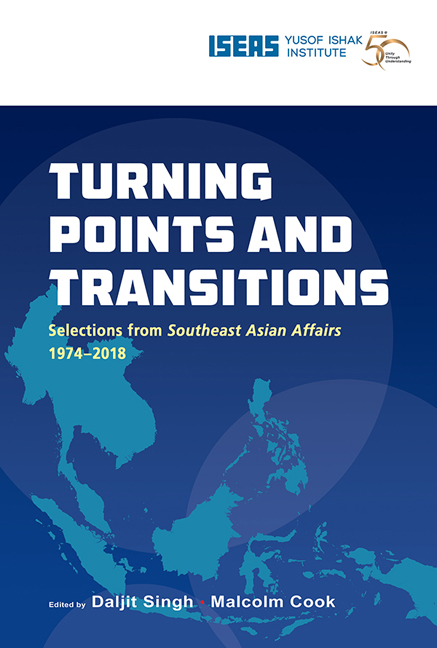Book contents
- Frontmatter
- Contents
- Message from the Director
- Foreword
- Foreword
- Introduction
- THE REGION
- The Diplomatic Emergence of China and Its Implications for Southeast Asia (1975*)
- Stability and Security in the Region after ANZUK (1975)
- The Question of the “Overseas Chinese” (1976)
- Southeast Asia 1976: The Handling of Contradictions (1977)
- The “Fukuda Doctrine” and Its Implications for Southeast Asia (1978)
- Expanding Horizons in Southeast Asia? (1994)
- AFTA in the Light of New Economic Developments (1995)
- The ASEAN Economic Miracle Unravels (1999)
- Southeast Asia in 1999: A False Dawn? (2000)
- East Timor's Future: Southeast Asian or South Pacific? (2001)
- Southeast Asia in 2002: From Bali to Iraq — Co-operating for Security (2003)
- The Year in ASEAN: The Charter, Trade Agreements, and the Global Economic Crisis (2010)
- Seeking Stability in Turbulent Times: Southeast Asia's New Normal? (2015)
- China's Two Silk Roads Initiative: What It Means for Southeast Asia (2015)
- China's International Strategy and Its Implications for Southeast Asia (2016)
- BRUNEI
- CAMBODIA
- INDONESIA
- LAOS
- MALAYSIA
- MYANMAR
- THE PHILIPPINES
- SINGAPORE
- THAILAND
- VIETNAM
Expanding Horizons in Southeast Asia? (1994)
from THE REGION
Published online by Cambridge University Press: 29 May 2019
- Frontmatter
- Contents
- Message from the Director
- Foreword
- Foreword
- Introduction
- THE REGION
- The Diplomatic Emergence of China and Its Implications for Southeast Asia (1975*)
- Stability and Security in the Region after ANZUK (1975)
- The Question of the “Overseas Chinese” (1976)
- Southeast Asia 1976: The Handling of Contradictions (1977)
- The “Fukuda Doctrine” and Its Implications for Southeast Asia (1978)
- Expanding Horizons in Southeast Asia? (1994)
- AFTA in the Light of New Economic Developments (1995)
- The ASEAN Economic Miracle Unravels (1999)
- Southeast Asia in 1999: A False Dawn? (2000)
- East Timor's Future: Southeast Asian or South Pacific? (2001)
- Southeast Asia in 2002: From Bali to Iraq — Co-operating for Security (2003)
- The Year in ASEAN: The Charter, Trade Agreements, and the Global Economic Crisis (2010)
- Seeking Stability in Turbulent Times: Southeast Asia's New Normal? (2015)
- China's Two Silk Roads Initiative: What It Means for Southeast Asia (2015)
- China's International Strategy and Its Implications for Southeast Asia (2016)
- BRUNEI
- CAMBODIA
- INDONESIA
- LAOS
- MALAYSIA
- MYANMAR
- THE PHILIPPINES
- SINGAPORE
- THAILAND
- VIETNAM
Summary
Southeast Asian states revised their strategic horizons during 1993 through an ASEAN-inspired initiative arising from the impact of the end of the Cold War. That development occurred, however, without a corresponding revision in economic horizons; nor was there any evident reconsideration of domestic political orders, which were in general strengthened.
During the Cold War, Southeast Asia and Indochina in particular had been coupled to international contention, which was inherent in the global balance of power. It was for this reason that Southeast Asia was described at one time as the Balkans of the Orient in an analogy with the condition of southeast Europe before the outbreak of World War I. With the end of the Cold War, global rivalry has ceased to exist in the same way as a point of reference for regional relations. This has been demonstrated with the end of the Cambodian conflict as a major international problem.
The states of Southeast Asia now inhabit a different strategic environment but not a fundamentally different international society, which is distinguished still by the absence of a common government able to enforce law and order. Furthermore, as a result of the end of the Cold War, Southeast Asia has begun to be called into question as a coherent category through which to address problems of regional security. A growing interdependence in security matters between Southeast and East Asia in particular has been perceived and registered by regional states. At issue, however, is the significance of a novel development in extended multilateral security dialogue joining Southeast and East Asia, inspired during the year by the Association of Southeast Asian Nations (ASEAN). Does that development indicate a genuine structural adjustment to a new strategic horizon or is it little more than a tinkering with the form of existing regional security arrangements?
Apart from involvement in vestigial security arrangements, which are both a legacy of colonialism and the Cold War, provision for either collective defence or collective security has not been undertaken on an exclusive basis by regional states. ASEAN, which repudiated military pacts from the outset, has established a limited regional security system based on a formula of conflict avoidance and management. The scope of that undertaking was extended within Southeast Asia in July 1992 but without augmenting its corporate membership.
- Type
- Chapter
- Information
- Turning Points and TransitionsSelections from Southeast Asian Affairs 1974-2018, pp. 60 - 66Publisher: ISEAS–Yusof Ishak InstitutePrint publication year: 2018



